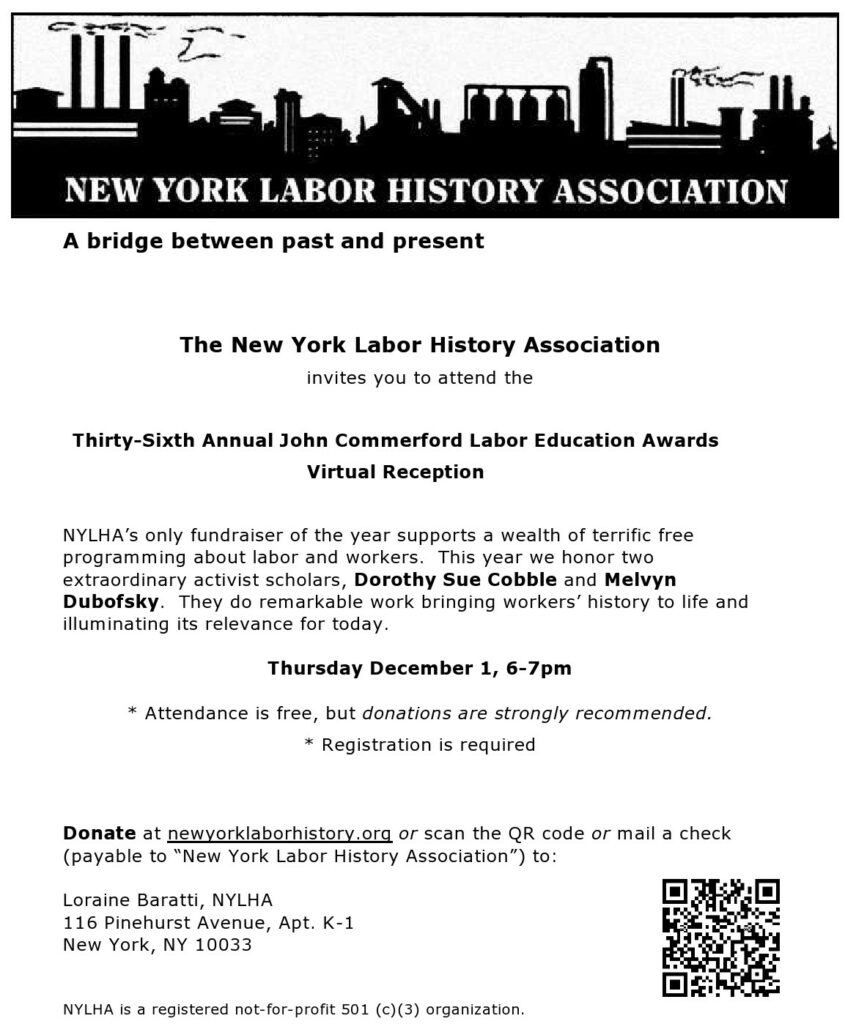
- This event has passed.
NY Labor History Association’s Annual Labor Education Awards
December 1, 2022 @ 6:00 pm – 7:00 pm EST

Each year since 1987, the New York Labor History Association has awarded the John Commerford Labor Education Award to two honorees for their contributions to workers’ empowerment.
The 2022 Awards will be held virtually on Thursday December 1, 2022, from 6-7 pm Eastern time, honoring the extraordinary activist scholars Dorothy Sue Cobble and Melvyn Dubofsky.
Registration is required. The event is free, but donations are strongly recommended.
Patrons contributing $250 or more will be listed in the program.
This event is a partnership between The New York Labor History Association, Labor Arts, and the Tamiment Library & Robert F. Wagner Labor Archive at the NYU Special Collections.
****************************************************
2022 COMMERFORD HONOREES
Dorothy Sue Cobble is an American historian, and a specialist in the study of work, social movements, and social policy. A distinguished professor emerita of history and labor studies at Rutgers University, she is the author of multiple prize-winning books, including Dishing It Out: Waitresses and Their Unions in the Twentieth Century (1991), The Other Women’s Movement: Workplace Justice and Social Rights in Modern America (2005), and The Sex of Class: Women Transforming American Labor (2007).
Her most recent book, For the Many: American Feminists and the Global Fight for Democratic Equality, reveals the grit, courage, and wisdom of the women who led the fight for economic justice and social democracy in the United States and abroad. Her next book draws on the far-seeing ideas of labor thinkers of the past to help us reimagine a fairer, more inclusive America.
Cobble grew up in a blue-collar family in Atlanta in the 1950s. She credits her passion for issues of justice and inequality to the fierce debates about civil and human rights that surrounded her in high school, to the sermons she heard in church, and to her father’s pioneering work on minimum-wage legislation in Georgia as a lobbyist for the Brotherhood of Locomotive Engineers. The jobs she held while completing her education profoundly shaped her thinking about work and labor reform. She worked as a waitress, receptionist, file clerk, union ship-scaler and stevedore, and eventually as an editorial assistant at TV Guide Magazine before receiving a B.A. degree in American Studies, cum laude, from the University of California at Berkeley and a Ph.D. in History from Stanford University. After directing the City College of San Francisco Labor Studies Program from 1980 to 1986, Cobble moved to Rutgers, where she founded the Center for Women and Work and taught classes for college students, working adults, and trade unionists. Recent honors include an Honorary Doctorate of Social Science from Stockholm University in 2017, and election to the Society of American Historians in 2018.
Melvyn Dubofsky has been an activist scholar and pioneering labor historian since the 1960s, helping to advance the field of “new labor history,” which focuses on the experiences of workers and social movements rather than institutions. A distinguished professor emeritus of history at Binghamton University, he has written extensively about the role of politics and state action in the changing fortunes of the American labor movement, and he stresses the role culture and the development of capitalism play in the American labor movement.
At the Fernand Braudel Center at Binghamton his research has looked at how changing technology, such as automation, has driven worker activism. Dubofsky has taught and participated in collaborative projects with other scholars in England, Israel, Austria, the Netherlands, France, and the former Soviet Union.
He grew up in the middle of the last century in a Brooklyn far different from today, where most neighborhoods were drawn on ethnic lines, with distinctly mixed class compositions with working people, petty proprietors, and even professionals (doctors, dentists, and attorneys) living next door to each other. His high school in Bedford Stuyvesant (Brooklyn’s version of Harlem) was the borough’s most diverse school, with a substantial Black student body and a small white majority of mostly Jewish, Italian, and Irish teens. The impact of the Senator McCarthy fueled “red scare” was personal: his high school economics teacher and four of his first-year college teachers lost their jobs for refusing to name names during state or federal investigations. Those experiences led him, in graduate school, toward studying the history of working people, a field of study that did not exist in the 1950s.
Among his most notable books are When Workers Organize: New York City in the Progressive Era (1967), We Shall Be All: A History of the Industrial Workers of the World (1969), John L. Lewis: A Biography (1977, co-written with Warren Van Tine); The State and Labor in Modern America (1994); and Hard Work: The Making of a Labor Historian (2001). Currently, he is editing a two-volume history of American Economic, Business, and Labor History for Oxford University Press.